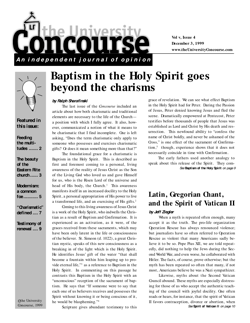Bringing the masses from starvation to full strength
by Kathleen van Schaijik
The Concourse has received so many articles concerning liturgy and spirituality lately that we have decided to dedicate an entire issue to the subject. Other articles are being held until issue 5, which, if luck holds, will appear next week.
One of the difficulties in this on-going discussion about campus spiritual and liturgical culture is that traditionalists and charismatics tend to talk past each other.
Traditionalists are generally more concerned with the objective dimension of the faith—with cherishing it whole and entire; with preserving it from heresy, heterodoxy and secularization; with approaching sacred mysteries in a manner that is fitting and worthy. Charismatics, on the other hand, are typically more concerned with the subjective dimension—that faith be alive; that individuals come into genuine, personal, living contact with the God who saves; that prayers of contrition and praise be, above all, heartfelt.
Clearly there is no inherent contradiction here. Each dimension is real and necessary to the other. But, given the fallen and limited nature of humanity, surface tensions and painful misunderstandings are inevitable.
It is difficult for traditionalists to understand how charismatics who profess orthodoxy and docility to Rome can seem so careless about Church directives—as in preferring the guitar to the organ and making such free use of extra-ordinary ministers of the Eucharist at Mass. Or how they can square their out-spoken love for Jesus with an unblushing disregard for the condition of His bride—as if it didn’t bother them at all to see her unwashed, ill-mannered and in rags, when she has been endowed by her Lord with a splendid array and every grace and beauty imaginable.
The charismatics, on the other hand, wonder how in the world anyone can be worried about things like clothes and etiquette when people are dying out there for crying out loud! Gregorian chant and Latin and all that may very well be superior; fine; what good does it do if it leaves people cold? If it makes them feel shut out because it is so remote from their experience? Except for things that are expressly forbidden by the Church, we should make every cultural concession possible, in order to gather in as many as we can before it is too late.
Here is analogy that might help clarify things for both sides.
When a person is starving, he cannot digest anything more substantive than thin gruel. His system is simply incapable of taking it in. It is no use to point out that a full meal is objectively more nutritious than gruel. We are speaking of a particular person in a desperate situation. Gruel will save him; meat might kill him.
Now, from the point of view of culture, ordinary eighteen year-olds coming out of the world today are starving. Unless they grew up in exceptional families or circumstances, their minds and imaginations have been fed on television, video games, florescent colors, hideous music, pornography and other things calculated to cramp, shrivel and ossify the human soul.
It is true (I don’t see how anyone can deny it) that Gregorian chant, for instance, is culturally superior to the music we are usually served at Steubenville liturgies. In other words, it is objectively more nourishing to the human spirit, as well as more “adequate” to the mysteries of our faith. But from a subjective point of view, it is also true that most of our students—especially when they first arrive on campus—would likely be overwhelmed or even spiritually “shut down” by such plenitude, which is simply beyond what their souls can take in. Therefore, there is great pastoral wisdom and tenderness expressed in the insistence on moderating our liturgical culture to suit the inward condition of so large a portion of our congregation.
However, by the same token, we should not forget that for people who are in full health, thin gruel is a starvation diet.
The purpose of thinning down the food of the starving man is precisely to restore him to health. We should not resent it, then, if as his strength increases he begins to demand more substantial fare.
There are many students at FUS now who come from families who raised them from childhood on wholesome cultural food. And the longer the other kind stay at FUS, the more their spirits are flowering under Grace, and under the influence of religious friends, wholesome pastimes and the knowledge gained in their classes, the hungrier they become for strong liturgical meat. It would be a kind of cruelty to refuse these the nourishment they need to continue to grow and thrive on the grounds that it would be overwhelming for other people.
So, here is the superhuman challenge facing the campus ministry at Franciscan University: to provide a wholesome liturgical diet for members of our community at every point on the scale between cultural starvation and blooming health. Thankfully, super-human help is available. But we should not expect perfection on the instant. Let us all try hard to practice patience and charity while we’re waiting.
Kathleen van Schaijik
Butch Kinerney, Website reader
Mr. Kinerney, who is not connected with FUS, found the article he refers to by an altavista search on “Babywise.”


